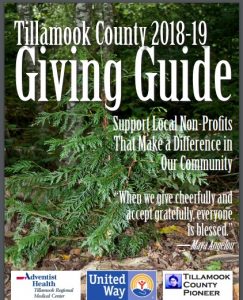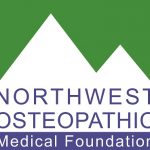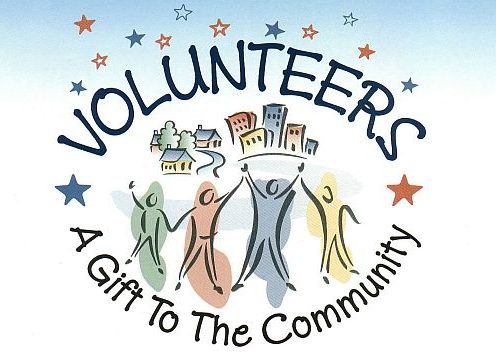By Linda Tate, Communications Director, Northwest Osteopathic Medical Foundation
Welcome back! We had a great week last week with Dr. Lei Ross and her blog on Aging Stereotypes. We will all be elderly someday, and how we think of our elders today, may shape how our children see us when it’s our turn. Something to think about for sure.
With the holidays approaching, people are starting to think about volunteering. Where to do it, how to get it done with all their other commitments, and wondering how many of their resources to commit to the projects. That’s fantastic. It’s a feel good time of year, is it not? We all feel better after we donate toys to a toy drive, spoon soup into a homeless families bowl, or hand out love boxes through our church to those on the street who have nothing.
There is actually science behind why this makes us feel better, and I will get into that in a bit. Right now, however, I would like to talk about volunteering in a different light. A “round the calendar” light. A “don’t plan it out” light. This concept may be foreign to some, but not to all. Let’s chat about those times you’ve “volunteered” without thought of how good it will make you feel.
For example, feeding birds. People feed birds at the park, at the pond, on the beach, and in their own homes. There’s something very comforting in watching a wild bird eat what you have to offer, or bathe in a birdbath of your making. Hearing the rotations of a Hummingbird’s wings wiz past your head on it’s way to your feeder is exciting. You grab your camera in the hope of catching a great shot for posterity. But why?
The Alzheimers Prevention Registry reports this: In a study that was conducted by researchers from Johns Hopkins Bloomberg School of Public Health, it was determined that those who volunteered to help young children learn to read, fared better than those who did not. “We expected the brains of study participants to shrink as part of the normal aging process,” said Michelle Carlson, PhD, Associate Professor, Department of Mental Health at Johns Hopkins Bloomberg School of Public Health and Core Faculty at Johns Hopkins Center on Aging and Health. “Instead, after two years in a program that involved them in meaningful, social activity, their memory centers either maintained their size or grew modestly.”
“We learned that activity with a purpose may benefit cognitive function and memory in older adults,” Dr. Carlson said. “The magic ingredient seemed to be getting out of your home and getting out with a purpose.”
So we see the science in this study behind the benefits of volunteering, but is there more? Providence Health seems to think so. Here’s what they said, “Volunteering can be a mental pick-me-up, too. When we feel empathy or act generously it can increase levels of oxytocin in the brain. Oxytocin, a hormone associated with trust and feelings of closeness (also known as the ‘hug hormone‘), may reduce stress and increase feelings of calm.”
Ahhhh, good old Oxytocin. The “hug hormone“. Getcha some!
Have you ever hugged someone who was in distress? I remember several times when a hug was not asked for, but I volunteered it regardless. Once, was when I was at the airport. A young girl stood alone, crying. I opened my arms and she came to me, and I hugged her until the tears stopped. This then enabled her to verbalize what the issue was (she had purchased the wrong ticket, and wanted to be in Portland MAINE, not Portland OREGON), and now had no money or any way to leave the airport. I assured her the airline would help, and asked her to look around and note there are no skeletons of stranded passengers afoot at the airport. She made it home.
Another time, I was paying my respects to a relative at the cemetery and as I was driving out, I noticed a woman, sitting next to a fresh grave, all alone in her grief. My head said, “keep going, this is none of your business“, but my heart and my gut said, “Don’t listen to your brain, your wisdom lies with us“. And so I turned around, walked to her, and asked the question, “do you need a hug?“. Without looking up, she reached a hand up to me, and literally pulled me down to the ground where she embraced me and cried her heart out. No words were spoken between us. I eventually said, “are you feeling better now? Do you want me to leave?” to which she nodded a yes. I will never forget her.
Giving Guide_2018_06_4WEBxs (1)
Giving Guide_2018_06_4WEBxs (1)“>
Volunteering is an act of humanity. It can’t be forced, but only given freely. It comes without repayment, and it comes without expectations. Volunteering is when we make that connection to human, plant, or animal…any living thing that needs us to volunteer the core of who we are…that is our gift to one another. In doing so, like the Grinch Who Stole Christmas, our hearts may not enlarge in size, but our brains certainly do.
The next time someone asks you if you do volunteer work, think about it in a different light. Most of us can say, “yes, I do“. Listening to someone vent about their day isn’t paid work, now is it. Making sugar cookies for the neighborhood kids to decorate isn’t in a job description anywhere, right? Mowing your elderly neighbors lawn wasn’t on your list of fun things to do this weekend, yet you did it anyway, didn’t you?
So yes, Virginia, there is a Santa Clause, and he lives in each one of us. He has many names, compassion and empathy being two of them. Reaching out to other living things and being kind, is the very act of volunteering the core of who you are. This video has all the feels:
https://youtu.be/2nvNZch2Vuc
There now, doesn’t that feel good?

The Northwest Osteopathic Medical Foundation is a public charity committed to Advancing Wellness through the Osteopathic Approach. As a charity, we do not represent any medical school, medical association, medical practice, or individual physician.
This blog should not be considered to be medical advice. Your personal health is best discussed one-on-one with your personal physician. Rather, this blog is intended to highlight the distinctive philosophy and practice of osteopathic medicine as expressed by the author and does not necessarily represent the opinion of the Northwest Osteopathic Medical Foundation, or other Osteopathic physicians. The information and opinions are solely those of the author.


.png)